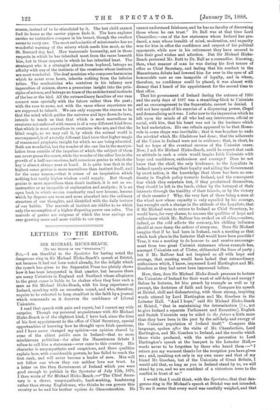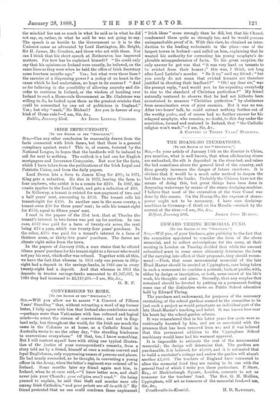LETTERS TO THE EDITOR.
SIR MICHAEL HICKS-BEACH.
[To THE EDITOR OF THE "SPECTATOR."] Slf6-I am thankful to the Spectator for having noted the dangerous ring in Sir Michael Hicks-Beach's speech at Bristol, not because it had not been noted already, for the delight which the speech has given to the Separatist Press too plainly shows how it has been interpreted in that quarter, but because there are many Unionists in England and Scotland whose allegiance to the great cause is liable to be shaken when they hear such a man as Sir Michael Hicks-Beach, with his long experience of Ireland, speaking with an uncertain sound, and who, therefore, require to be exhorted to keep steadfast in the faith by a journal which commands as it deserves the confidence of Liberal Unionists.
I read that speech with pain and regret, but I cannot say with surprise. Though my personal acquaintance with Sir Michael Hicks-Beach is of the slightest kind, I have had, since the time of his first appointment to the office of Chief Secretary, special opportunities of knowing how he thought upon Irish questions, and I have never changed my opinion—an opinion shared by some of the ablest public men in Ireland—that no more mischievous politician—for after the Maamtrasna debate I refuse to call him a statesman—ever came to this country. His character is unsympathetic and suspicions, and these qualities explain how, with considerable powers, he has failed to reach the first rank, and will never become a leader of men. Men will not follow one whom they can neither love nor trust. In a letter on the then Government of Ireland which you were good enough to publish in the Spectator of July 15th, 1876, I thus wrote of Sir Michael Hicks-Beach :—" The Chief Secre- tary is a clever, unsympathetic, hard-working, headstrong rather than strong Englishman, who thinks he can govern this country as he and his brother squires do Gloucestershire. He cannot understand Irishmen, and he has no faculty of discerning those whom he can trust." Dr. Ball was at that time Lord Chancellor,—one of the few statesmen whom Ireland has pro- duced, a man whose breadth of mind, moderation, and, sagacity won for him in office the confidence and respect of his political opponents, while now in his retirement they have secured t& him their good wishes and affection. But Sir Michael Hicks- Beach preferred Mr. Batt to Dr. Ball as a counsellor. Knowing, then, what manner of man he was during his first tenure of office as Chief Secretary, and feeling that his conduct in the Maamtrasna debate had lowered him for ever in the eyes of all honourable men as one ineapable of loyalty, and in whom, therefore, no confidence could be placed, it was almost with dismay that I heard of his appointment for the second time to that office.
That his government of Ireland during the autumn of 1886 and the early days of 1887 was a etumbling-block to Unionists and an encouragement to the Separatists, cannot be denied. I will not here speak of his exercise of a dispensing power, illegal and demoralising as it was. I refer now to the impression which he left upon the minds of all who had any intercourse, official or social, with him, that his heart was not in the business which he had undertaken. His one refrain appeared to be that Home- rule in some shape was inevitable ; that it was hopeless to undo the mischief which Mr. Gladstone had done ; that the adherents of the Union in Ireland were not in evidence ; that, in short, he had no hope of the eventual success of the Unionist cause. Now, I ask Sir Michael Hicks-Beach, could he expect that such an attitude in such a crisis would inspire Irish Unionists with hope and confidence, enthusiasm and courage ? Does be not know that the chief, the only hindrance, to the Loyalists in Ireland openly avowing their loyalty and aiding the Government by overt action, is the knowledge that there has been no con- tinuity in English policy towards Ireland, and the consequent fear which they entertain lest, if they proclaimed themselves, they should be left in the lurch, either by the betrayal of their interests through the timidity of their friends, or by the victory of their enemies P Why, the very fact of there being a man at the wheel now whose capacity is only equalled by his courage, has wrought such a change in the attitude of the Loyalists, that if Sir Michael were to return to Ireland as Chief Secretary, he would have, for very shame, to assume the qualities of hope and enthusiasm which Mr. Balfour has evoked on all sides,—unless, indeed, as the cold affects the mercury, his chilling influence should at once damp the ardour of every one. Does Sir Michael imagine that if he had been in Ireland, such a meeting as that which took place in the Leinster Hall would have been possible? True, it was a meeting to do honour to and receive encourage- ment from two great Unionist statesmen whose example has, amongst Unionists out of Ulster, obliterated the lines of party ; but if Mr. Balfour had not inspired us all with hope and courage, that meeting would have lacked that extraordinary enthusiasm which, I know, impressed Lord Hartington and Mr. Goschen as they had never been impressed before.
How, then, does Sir Michael Hicks-Beach presume to lecture- the Unionists of Ireland for their want of self-help and energy P Before he lectures, let him preach by example as well as by precept, the doctrines of faith and hope. Compare his speech at Bristol, chill and disheartening, with those strong, inspiring words uttered by Lord Hartington and Mr. Goschen in the Leinster Hall. "And I hope," said Sir Michael Hicks-Beach at Bristol, "that in maintaining the determination e., not to give Ireland a separate Parliament and Executive], English and Scotch Unionists may be aided in the future a little more than they have been in the past by the self-help and energy of the Unionist population of Ireland itself." Compare this language, spoken after the visits of Mr. Chamberlain, Lord Hartington, and Mr. Goschen to Ireland, and the results which those visits produced, with the noble peroration to Lord Hartington's speech at the banquet in the Leinster Hall,— words never to be forgotten by those who heard them :—" I return you my warmest thanks for the reception you have given me ; and, speaking not only in my own name and that of my friend Mr. Goschen, but of the Unionists of Great Britain, I would add that, so long as you in Ireland stand by us, we will stand by you, and we are confident of a victorious issue to the conflict in front of us."
I would that I could think, with the Spectator, that that dan- gerous ring in Sir Michael's speech at Bristol was not intended. To me it seems that every word was carefully weighed, and that
the mischief lies not so much in what he said as in what he did not say, or, rather, in what he said he was not going to say. The speech is as hostile to the Government as it is to the Unionist cause as advocated by Lord Hartington, Mr. Bright, Sir H. James, Mr. Goschen, and those who act with them. Nor -can I think that his short speech at Netheravon has improved matters. For how has he explained himself? "He could only say that his opinions on Ireland were exactly, he believed, on the same lines as they were when he held the office of Irish Secretary some fourteen months ago." Yes ; but what were those lines ? the exercise of a dispensing power ? a policy of no heart in the cause which be had undertaken, no hope in its success P "And as for believing in the possibility of allowing anarchy and dis- order to continue in Ireland, or the wisdom of handing over Ireland to such a Home-rule Government as Mr. Gladstone was willing to do, he looked upon them as the greatest mistake that could be committed by any set of politicians in England." Yes ; but why "such," Sir Michael ? Are you in favour of any kind of Home. rule?—I am, Sir, &c., Dublin, January 23rd. AN LUST' LIBERAL UNIONIST.



















































 Previous page
Previous page